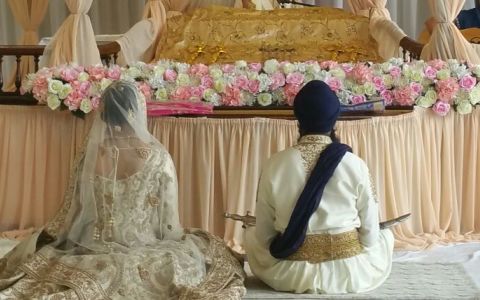Young British Sikhs at daggers drawn over interfaith weddings
by - 21st September 2016
Footage of young Sikhs sitting down to protest in Leamington released by Daily Sikh Update on its Facebook page.
LURID headlines of a ‘blade gang’ in masks storming a Sikh wedding ceremony in a genteel English spa town hit Sunday breakfast tables on 11 September.
Armed police arrived at the Leamington Spa Gurdwara, which is one of the largest Sikh temples outside India, early on Sunday 11 September 2016, due to reports of ‘men with blades forcing their way into the building’ during a wedding ceremony.
The police arrested 55 people for aggravated trespass, all under the age of 40, who were later released on bail.
It was a dramatic scene for the anniversary of 9/11: the local area was cordoned off, a troop of armed police arrived and left with a large number of men in black masks.
But the reports betrayed ignorance about the Sikh religion, and obscured the story of growing tensions within the Sikh community and a younger generation that is taking its faith more seriously.
Police later said that the men’s knives were legally held for religious ceremony.
Sikhs carry knives called kirpans, which they say symbolise mercy and honour, and are part of the ‘5Ks’ of their faith.
The men were there to protest, and they have a lot of sympathy from some parts of the community: the Sikh Federation press secretary Gurjeet Singh called the police response ‘disproportionate’.
The media reaction also angered many: ‘We’re still trying to get to the bottom of why the media by the afternoon were using things like “sword wielding gang stormed temple’’’, Dabinderjit Singh, an adviser for the Sikh Federation, a political pressure group, told Lapido Media.
‘There was no sword wielding, and I don’t think there was a storm. That image would portray… three-foot swords, people who pushed themselves in, possibly used violence. And yet, from what we can see, they were sitting down, chanting the name of [God], with placards.’
Others say they understand that the police had to act on the information they had been given.
Instead, flak is directed at the members of the Sikh community who called the police and gave an impression of armed men taking hostages.
‘[They] provided false information and wasted police time and resources by exaggerating the seriousness of the situation,’ according to a statement from the Sikh Federation.
Marriage
Sikh Youth UK, who organised the protest, said in a statement that they were ‘deeply saddened’ at the way that the ‘rogue gurdwara committee’ at the Leamington Spa temple had handled the situation.
Their peaceful protest, Sikh Youth UK told Lapido, was against an interfaith marriage ceremony that was about to take place, which, they claim, flouted rules that prohibit mixed marriage ceremonies taking place within gurdwareh [Ed: this is the plural].

‘The bottom line is that these gurdwareh are doing something that is against the protocol of the Sikhs,’ said Jasveer Singh Gill, from the Sikh Press Association, which represents Sikh Youth UK.
‘The management of the gurdwareh are not looking to discuss these issues, so it’s what they’ve come to.’
He said the issue was not that an inter-faith marriage was taking place per se, but that a non-Sikh was reciting the formal Sikh ceremony, the Anand Karaj.
‘The vows are said towards the Guru, about following the Guru’s path,’ said Jasveer. ‘If someone is sitting through the wedding ceremony without having any kind of inclination to follow a Sikh [path], then it would just be a showcase wedding.
‘It has been described as starting your marriage with a lie.’
Nonetheless, the British Sikh Report in 2014 found that 45 per cent of the Sikh community in the UK would not be comfortable with a close family member marrying someone outside the Sikh community.
Protests
The incident at Leamington Spa is only the latest in a series of similar protests to take place at Sikh temples by young Sikh men over the past few years.
The protests led the Sikh Council UK, which represents the temples, to set clearer rules last year.
Only those who are Sikh or have converted can now use the Anand Karaj.
They asked protesters to hold off for six months while the temples were re-educated, but some rejected the proposals.
Many in the Sikh community disagree with the stance taken by groups such as the Sikh Federation and the Sikh Council.
‘This is a fairly recent issue,’ said Onkardeep Singh Khalsa, a community organiser who identifies with a more liberal expression of the Sikh faith.
‘In the past, interfaith marriages were happening throughout India and other parts of the world for far, far longer than Sikhs have been in this county. It’s a very UK issue.’
[See our media briefing on the resurgence of orthodoxy in the British Sikh community.]
‘For most of my life I’ve known people within the community, family and friends, who have married non-Sikhs,’ said Kamalroop Singh, whose PhD researched the Dasam Granth Sahib, part of the Sikh holy scriptures. ‘Up until recently, it’s never been a problem.
‘Personally, I didn’t think it [the protest] was a good idea… the Sikh principles are simple: Don’t hurt somebody. But the girls getting married – you’ve ruined her wedding day. You’ve hurt her and her family. That’s fundamentally against Sikh principles.
‘Guru Nanak said don’t practice empty rituals . . . so I can understand this protest. But I don’t agree with the manner in which they’re protesting . . . [it] is totally unnecessary, and it brings a bad image of our community.’
Gurmel Singh, secretary general of the Sikh Council UK fears protests may escalate.
‘There might be directives from the religious authorities in India. I hope we don’t reach that point.’
